人教版(新课程标准)必修1 Unit 3 Travel journal Listening and Speaking名师课件(16张ppt)
文档属性
| 名称 | 人教版(新课程标准)必修1 Unit 3 Travel journal Listening and Speaking名师课件(16张ppt) |
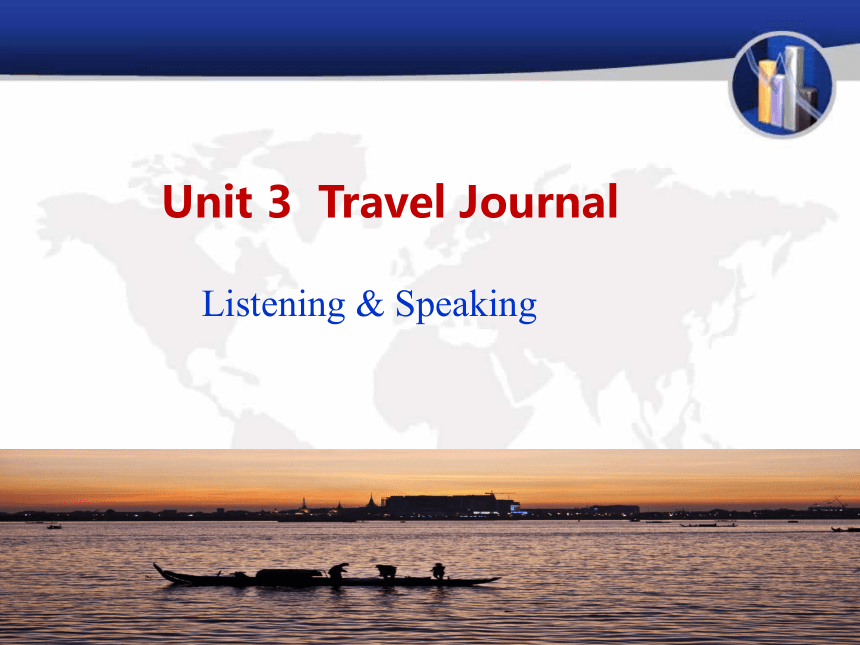
|
|
| 格式 | ppt | ||
| 文件大小 | 2.6MB | ||
| 资源类型 | 教案 | ||
| 版本资源 | 人教版(新课程标准) | ||
| 科目 | 英语 | ||
| 更新时间 | 2022-01-22 12:27:16 | ||
图片预览



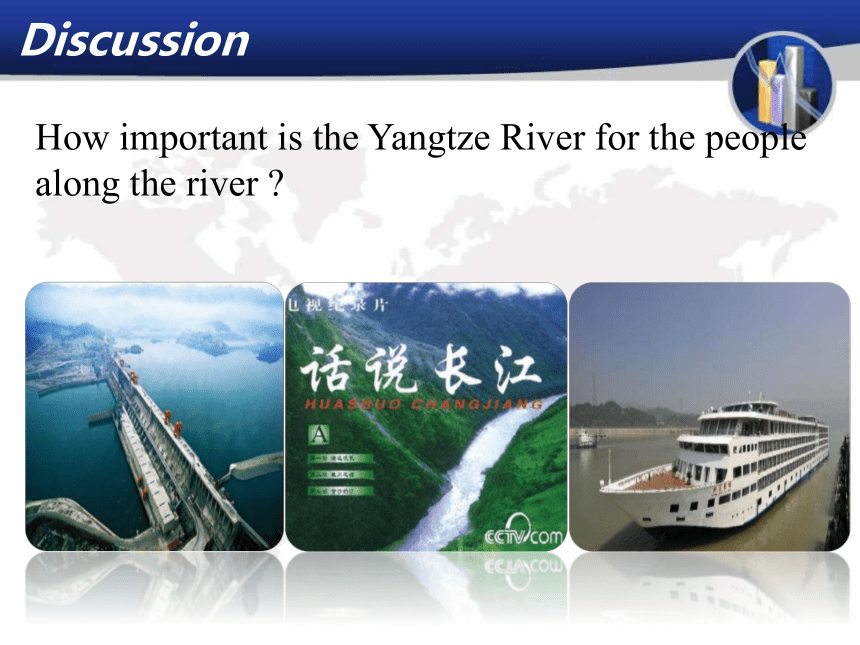
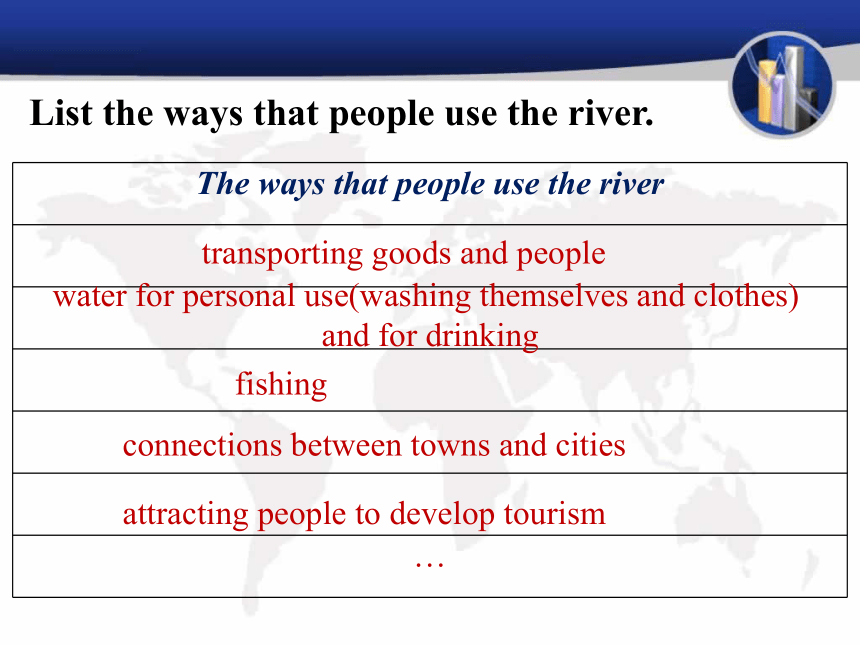
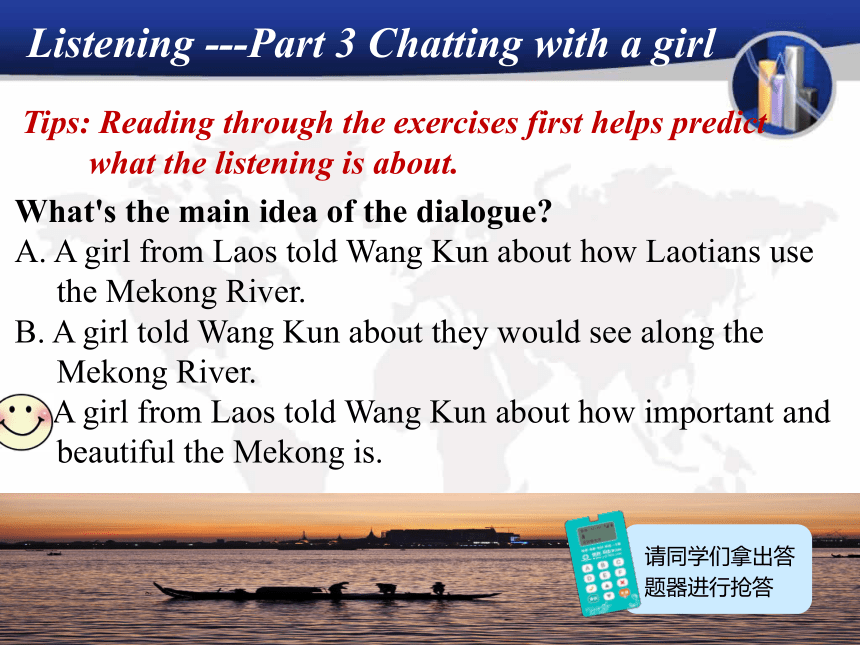
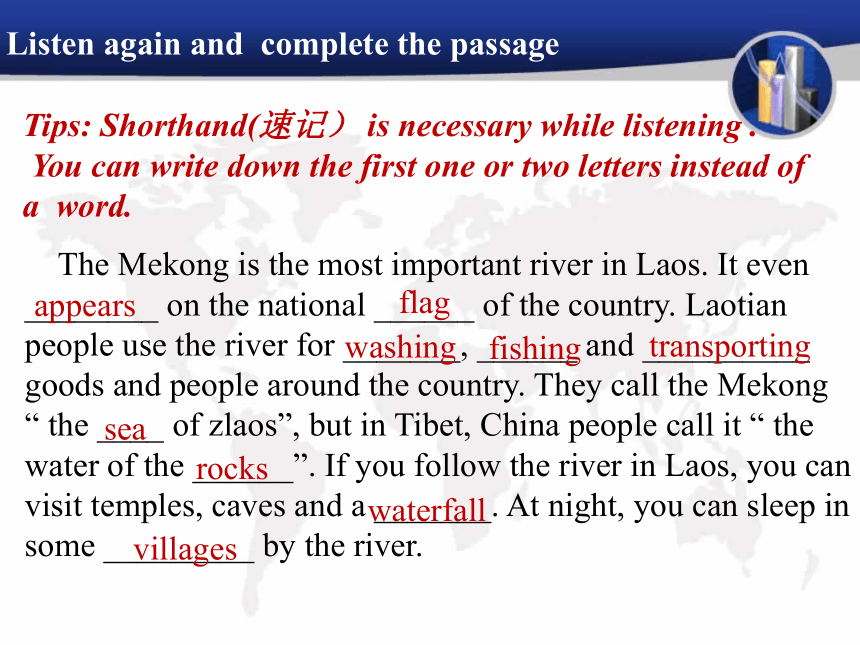
文档简介
(共16张PPT)
Unit 3 Travel Journal
Listening & Speaking
Warming up
Where did you go during the National Day
What did you see and what did you learn
请同学们拿出答题器进行抢答
Brainstorm as much information about the Yangtze River.
Discussion
How important is the Yangtze River for the people along the river
The ways that people use the river
…
List the ways that people use the river.
transporting goods and people
water for personal use(washing themselves and clothes)
and for drinking
fishing
connections between towns and cities
attracting people to develop tourism
Listening ---Part 3 Chatting with a girl
Tips: Reading through the exercises first helps predict
what the listening is about.
What's the main idea of the dialogue
A. A girl from Laos told Wang Kun about how Laotians use
the Mekong River.
B. A girl told Wang Kun about they would see along the
Mekong River.
C. A girl from Laos told Wang Kun about how important and
beautiful the Mekong is.
请同学们拿出答题器进行抢答
Listen again and complete the passage
The Mekong is the most important river in Laos. It even ________ on the national ______ of the country. Laotian people use the river for _______, ______ and __________ goods and people around the country. They call the Mekong “ the ____ of zlaos”, but in Tibet, China people call it “ the water of the ______”. If you follow the river in Laos, you can visit temples, caves and a _______. At night, you can sleep in some _________ by the river.
appears
flag
washing
fishing
transporting
sea
rocks
waterfall
villages
Tips: Shorthand(速记) is necessary while listening .
You can write down the first one or two letters instead of a word.
Listening --- Part 5 By the river in Laos
Discuss and list the things that might happen
to change the life on the river.
Things that might happen to change the life on the river
…
pollution of the water supply
decline in fish supplies
silting up (淤积) of the river
dam-building
Pre-listening
Disicussion
1. Is the photo a moddern one or was it taken many years ago How do you know
2. What information can you get from the picture
Listening for general idea –中心把握
Listen and write the main idea in one sentence.
________________________________________
________________________________________
________________________________________
Wang Kun and Wang Wei met an old man fishing
by the river in Laos, and they talked about the life on the river and the changes.
Tips: If you want to get the main idea, it is
important for us to grasp the key words.
Listening for specific information -信息捕捉
Life along the river in the past Life along the river now
1.___________________
_______________. 1.________________
___________.
2.__________________
_______________. 2._________________
_______.
3.___________________
_________. 3.__________________
__________________
_________.
Fill in the chart.
Tips: Taking notes is necessary while listening.
There were many small villages by the river
The fishermen used to
catch fish
They sold the fish to make
money
Some villages have
disappeared
New dams have been
built
Some people have
moved to the towns and
work there
Speaking & Talking -口头运用
Discussion in groups
① Do people like the change of lifestyle What about
the old man’s attitude
② What are the benefits and disadvantages of
Three Gorges Dam project
请同学们拿出答题器进行抢答
Discussion in pairs
1. Make a list of other things that you expect Wang Kun and the girl or the old man might talk about.
2. Choose some of them to make up a dialogue, practice it and act it to the class.
Speaking & Talking -口头运用
Sample dialogue:
A--- Wang Kun B--- the girl
A: What’s the food like in Laos
B: It’s delicious. There are many fish dishes and a special fish soup.
The fishermen catch the fish and then cook it. You should try it.
A: I love to try new food. What will we see along the riverbank
B: Well, there are thick forests and mountains in the north of Laos and
many interesting plants, birds and animals in the south of Laos.
It’s so beautiful by the river that the scenery will take your breath
away.
A: That sounds wonderful. I can’t wait to get going. Thank you for
telling us so many things. Take care.
B: Have a nice time on your journey. Keep in touch and write to me if
you have time. Goodbye.
A: I will. Goodbye.
Talking and sharing -讨论与分享
1. What have I learnt in this period
2. What am I still confused about
3. What should do to make them clear
Homework课后作业
1. Collect as much information as possible about Laos, such as food, drink, clothes, custom etc.
2. Search on the internet to find some places of interest in China and in the world. Take notes of your findings and tell the class which place you want to visit most.
Unit 3 Travel Journal
Listening & Speaking
Warming up
Where did you go during the National Day
What did you see and what did you learn
请同学们拿出答题器进行抢答
Brainstorm as much information about the Yangtze River.
Discussion
How important is the Yangtze River for the people along the river
The ways that people use the river
…
List the ways that people use the river.
transporting goods and people
water for personal use(washing themselves and clothes)
and for drinking
fishing
connections between towns and cities
attracting people to develop tourism
Listening ---Part 3 Chatting with a girl
Tips: Reading through the exercises first helps predict
what the listening is about.
What's the main idea of the dialogue
A. A girl from Laos told Wang Kun about how Laotians use
the Mekong River.
B. A girl told Wang Kun about they would see along the
Mekong River.
C. A girl from Laos told Wang Kun about how important and
beautiful the Mekong is.
请同学们拿出答题器进行抢答
Listen again and complete the passage
The Mekong is the most important river in Laos. It even ________ on the national ______ of the country. Laotian people use the river for _______, ______ and __________ goods and people around the country. They call the Mekong “ the ____ of zlaos”, but in Tibet, China people call it “ the water of the ______”. If you follow the river in Laos, you can visit temples, caves and a _______. At night, you can sleep in some _________ by the river.
appears
flag
washing
fishing
transporting
sea
rocks
waterfall
villages
Tips: Shorthand(速记) is necessary while listening .
You can write down the first one or two letters instead of a word.
Listening --- Part 5 By the river in Laos
Discuss and list the things that might happen
to change the life on the river.
Things that might happen to change the life on the river
…
pollution of the water supply
decline in fish supplies
silting up (淤积) of the river
dam-building
Pre-listening
Disicussion
1. Is the photo a moddern one or was it taken many years ago How do you know
2. What information can you get from the picture
Listening for general idea –中心把握
Listen and write the main idea in one sentence.
________________________________________
________________________________________
________________________________________
Wang Kun and Wang Wei met an old man fishing
by the river in Laos, and they talked about the life on the river and the changes.
Tips: If you want to get the main idea, it is
important for us to grasp the key words.
Listening for specific information -信息捕捉
Life along the river in the past Life along the river now
1.___________________
_______________. 1.________________
___________.
2.__________________
_______________. 2._________________
_______.
3.___________________
_________. 3.__________________
__________________
_________.
Fill in the chart.
Tips: Taking notes is necessary while listening.
There were many small villages by the river
The fishermen used to
catch fish
They sold the fish to make
money
Some villages have
disappeared
New dams have been
built
Some people have
moved to the towns and
work there
Speaking & Talking -口头运用
Discussion in groups
① Do people like the change of lifestyle What about
the old man’s attitude
② What are the benefits and disadvantages of
Three Gorges Dam project
请同学们拿出答题器进行抢答
Discussion in pairs
1. Make a list of other things that you expect Wang Kun and the girl or the old man might talk about.
2. Choose some of them to make up a dialogue, practice it and act it to the class.
Speaking & Talking -口头运用
Sample dialogue:
A--- Wang Kun B--- the girl
A: What’s the food like in Laos
B: It’s delicious. There are many fish dishes and a special fish soup.
The fishermen catch the fish and then cook it. You should try it.
A: I love to try new food. What will we see along the riverbank
B: Well, there are thick forests and mountains in the north of Laos and
many interesting plants, birds and animals in the south of Laos.
It’s so beautiful by the river that the scenery will take your breath
away.
A: That sounds wonderful. I can’t wait to get going. Thank you for
telling us so many things. Take care.
B: Have a nice time on your journey. Keep in touch and write to me if
you have time. Goodbye.
A: I will. Goodbye.
Talking and sharing -讨论与分享
1. What have I learnt in this period
2. What am I still confused about
3. What should do to make them clear
Homework课后作业
1. Collect as much information as possible about Laos, such as food, drink, clothes, custom etc.
2. Search on the internet to find some places of interest in China and in the world. Take notes of your findings and tell the class which place you want to visit most.
